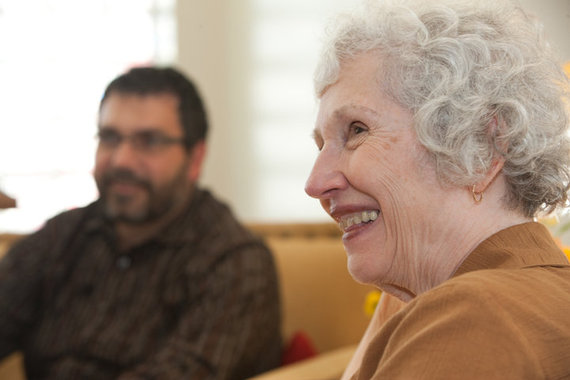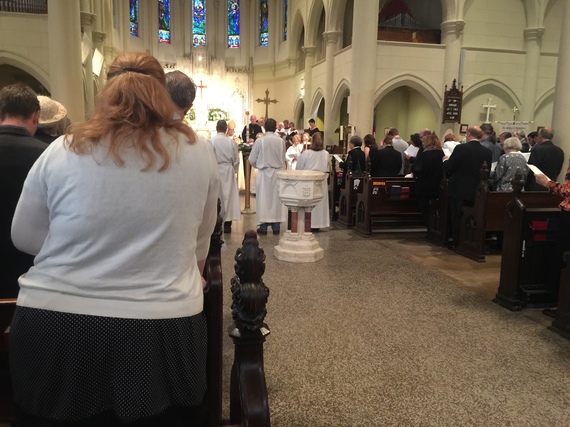
Last Friday I flew to Memphis to attend the memorial service of a beloved friend and mentor, Phyllis Tickle. As the founding Religion Editor at Publisher's Weekly, the leading journal of the book trade, Phyllis spent much of the first half of her career reviewing books on religion and spirituality, then wrote the very kind of books she reviewed in the second half. As her NY Times obituary stated, Phyllis was "a leading voice in the amorphous but evolving Emergence Christianity movement which rejects the hierarchies and many of the orthodoxies of the past and predicts a convergence of the various strands of Christianity, each of which had historically gone its own way." (In other words, Phyllis approached her faith differently than James Bond did his martinis: she liked things both shaken and stirred. That's what many of us loved about her.)
Ironically, however, when it came to her memorial service, Phyllis chose to embrace a form of worship that is about as hierarchical and orthodox as Protestant worship can be: a "Requiem Eucharist" service at St. Mary's Episcopal Cathedral following the old Episcopal "Rite I" liturgical form ("Rite I" is even "higher church" than the more common "Rite II" service). As a relative told me, Phyllis said she wanted to be laid to rest "by a man wearing a dress."
The climax of the service - as at all Episcopal services - was the partaking of the Eucharist, or Holy Communion. Before Communion began, we prepared ourselves by "passing the peace," in which the celebrant announced, "The peace of the Lord be always with you," and we responded, "And with thy spirit." Then, we turned to each other, shaking hands and saying, "May the peace of Christ be with you."
As we passed the peace, I was surprised to see a friend of mine leave her pew and cross to the opposite side of the sanctuary to pass the peace to another friend. What made this gesture surprising was not the length of the traverse but the fact that, as far as I'm aware, these two have not spoken to one another for the better part of a year after a major disagreement ruptured their relationship.
I thought to myself, "How wonderful! They're honoring Phyllis in the best way they can. They may not have resolved their differences but they know Phyllis loved each of them dearly. They're paying respect to Phyllis by choosing to respect each other. And that's enough for now."
Ironically, as the Senior Minister of a church that is part of Omaha, Nebraska's Tri-Faith Initiative - where a Jewish synagogue, an Islamic mosque, and a Christian church (mine) are building separate worship facilities and a common community center on a 35-acre campus in the center of Omaha - the simple, beautiful gesture I witnessed between two estranged friends reminded me of one of the greatest pieces of wisdom I have found in the Qur'an.
According to the Qur'an, when God created human beings, God commanded the host of heaven to bow down to us. At first, the angels objected, as they could see clearly that humanity was flawed. "They will commit mayhem and evil," the angels exclaimed, "even murder!" In response, God said, "I know things that you do not." That stopped their complaining. While they could see no reason to bow down to humanity using their own wisdom, they respected God's wisdom and choice to create us. Therefore, they honored God by bowing.
Only Satan, known as Iblis in the Qur'an, refused to bow to humanity. He was a perfectionist! He pointed out, quite rightly, that he was made of far higher quality material than we were (fire as opposed to clay) How could he, as a higher-order being of greater perfection, ever bow to lowly humanity? Since Satan neither honored God's choice to create us, nor respected God's love for us despite our obvious imperfections, he was kicked out of heaven. (This story is recounted in bits and pieces in seven places, attesting to its importance in the Qur'an: Al-Baqarah 2.28-34, Al-'A'Rāf 7.11-18, Al-Hijr15.28-44, Al-'Isrāa' 17.61-65, Al-Kahf 18.50, Tā Hā 20.115-117, and Sād 38.71-85)
In the story of Iblis, I believe the Qur'an is identifying one of the greatest sources of evil in our world: self-righteous indignation (even self-righteous indignation that accurately perceives the flaws of another).
I watched from a distance in St. Mary's Episcopal Church while my two estranged friends, not unlike the angels of the Qur'an, humbly set aside any grounds for self-righteous indignation, real or perceived, to "bow" to each other out of recognition that they were each a beloved friend of Phyllis.
The fierce beauty of this collision between grievance and grace reminds me of a little-known and (to some) deeply embarrassing claim made by Luke's gospel about Jesus: Namely, that Jesus was simultaneously a sinner like us and the Beloved of God. (Luke 3:3, 22)
Most Christians claim that Jesus cannot be both sinner and savior. Yet when Jesus was baptized in the Jordan River, Luke tells us plainly that this baptism was for "repentance for the forgiveness of sins." (Luke 3: 3). Why would someone without sin undergo a baptism of repentance? Many claim that Luke was either mistaken or meant to say that Jesus was baptized for the forgiveness of our sins, not his own. They cite Hebrews 2:15 to buttress their argument, which claims that Jesus was "tested as we are, yet without sin." Yet Luke never read Hebrews. Nor was he familiar with the creeds, doctrines, and dogmas that would arise centuries later. A straight reading of Luke clearly indicates that Luke saw no problem with Jesus being both a repentant sinner and a savior (Cf. Luke 18:19: "Why do you call me good? No one is good but God alone.")
Personally, I don't feel qualified to decide between Luke and the unnamed author of Hebrews regarding Jesus' relationship with sin. I'm not sure any of us are, really. After all, throughout history we have considered certain acts to be sinful that we later regarded as innocent (e.g., same-sex marriage), while other actions that we considered innocent were later regarded as sinful (e.g., the subjugation of women). So who are we to judge?
I'm not trying to convince you one way or another about Jesus' moral state. I just find myself drawn to the idea that Jesus could be both a sinner and a savior. As far as I can tell, being "fully human," as every orthodox Christian claims Jesus was, includes struggling with sin (as the orthodox deny). While it may seem counterintuitive, I trust Jesus - and God - a lot more if Jesus struggled with the human propensity to sin. Why?
First, I distrust the basic impulse that leads people to insist, as Satan did in the Qur'an, that anyone worth bowing down to as God's Beloved must be perfect. As a Christian, I bow before Jesus not because I have assessed his moral state and deemed him worthy, but because God declared him worthy for God's own reasons - and confirmed it on Easter. I'm good with that.
Second, whatever Jesus' relationship with sin may have been, one thing I know for sure is that I am a sinner. And I hate my sin. I hate the ways I disappoint myself and others so much, in fact, that it takes constant effort to keep my hatred of sin from veering off into self-hatred, especially since I know that God hates sin more than I do. My natural inclination, therefore, when it comes to God, is to resist any kind of relationship. I erect barriers, set up roadblocks, and do most anything in my power to keep God from drawing too close. As a Christian progressive, I can even bring science into the ruse, arguing that the universe is far too large for a "personal relationship with God" to be even a remote option. Given the opportunity, I will even go so far as to cast blame on God, insisting that even if a "personal relationship" were possible, God wouldn't want it on account of my sin.
Frankly, if the only way that God can love me is for Jesus to be without sin, taking upon himself the punishment and wrath that God intended for me on the cross, this only confirms the judgment and self-hatred that I already arrived at on my own. No need for revelation here. Only, I feel more guilty and worthless than before. As if my sin wasn't bad enough, now I've made someone else suffer for sin that I should rightfully be punished for.
Yet if God proclaimed Jesus to be God's Beloved, with whom God was "well pleased," as a fully-human sinner like you and me, then the moment I actually believe this is the moment Jesus saves me - saves me not from God's judgment and condemnation but from my own. For if God loves a sinner as extravagantly as God loved Jesus, even going so far as to raise him from the dead, then how can I go on hating myself for my propensity to sin - or you for yours?
Instead, I find myself jumping at any opportunity at all to be in deeper relationship with God. I will not hesitate because this is my deepest yearning. "You have made us for yourself, O Lord," writes Augustine, "and our hearts are restless until they find their rest in you." (Confessions i.1) Jesus the sinner-savior clears the way for me to find this rest.
As I witnessed my two estranged friends honoring Phyllis Tickle last Friday afternoon by passing the peace of Christ to each other, I believe that they honored God even more fully than Phyllis. For they showed that, as deep as the divide between them may be, it is not deeper than their desire to act toward each other in the same way God acts toward us, as revealed by Jesus, the beloved sinner-savior of God. In this simple yet fierce act of grace, they became for each other what Nadia Bolz-Weber might call "accidental saints."

